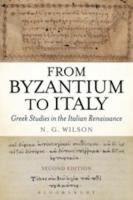
Bloomsbury (2016, 2nd ed.) p/b 231pp £25.99 (ISBN 9781474250474)
This book is the revision of the sequel to 1983’s Scholars of Byzantium (Duckworth), and embraces the new scholarship on how Greek literature from Byzantium was presented to the Latin West, and specifically the associated events from 1397 (Chrysoloras starts teaching in Florence) to 1515 (Aldus the printer dies). We have understood for long enough how the Christian regime in the West protected and promoted ‘pagan’ Latin literature, but what happened to Greek? Bruni, a key figure in the story, claimed that the language was restored after 700 years. W. adds ‘he would hardly have been exaggerating if he had claimed that the interval was a millennium’.
From tentative beginnings in the twelfth century we are introduced to the key players and their activities in the presentation and promulgation of Greek literature in the West, people like da Feltre, Filefo, Lascaris and Politian (the list could go on), who recognised the importance of these texts and took all the actions required to establish them in the mind of the educated reader and lay a tradition that would be good for half a millennium. In brief, they presented to us virtually the whole body of Greek literature that survived the depredations of the Fourth Crusade.
This elegant history is peppered with delights: Bruni’s struggle to translate Plato’s τὸ ἀγαθόν (‘the good’) into Latin because there was no definite article; the move from word-for-word translation from Greek into Latin, to the acceptance of the importance of idiom; Bessarion’s gift, in 1468, of ‘the main part’ (my italics) ‘of his collection’ (to Nicholas V’s Latin library in Venice: ‘The inventory lists 482 Greek volumes’). It is not that long since Chaucer’s clerke (poor but learned) could boast of 20 books, and Chaucer himself (‘The Legend of the Good Women’) of 50.
What these scholars achieved in such a short time is remarkable, and the benefits permanent. They made the case for the study of Greek literature; emended, translated and glossed texts; had them printed; occupied chairs of Greek; produced grammars and dictionaries to aid teaching and learning; championed Plato (‘follows the law of Moses and prophesies the law of Christ’!); and produced a Greek curriculum that was good for 500 years. And it took your reviewer 55 years to stumble into this specific aspect of the subject. So this elegant, learned and highly readable book exemplifies an aspect of classics recently aired by Richard Jenkyns—that there will always be something to discover for the first time. One reason why life as a classicist is so rich.
Adrian Spooner
